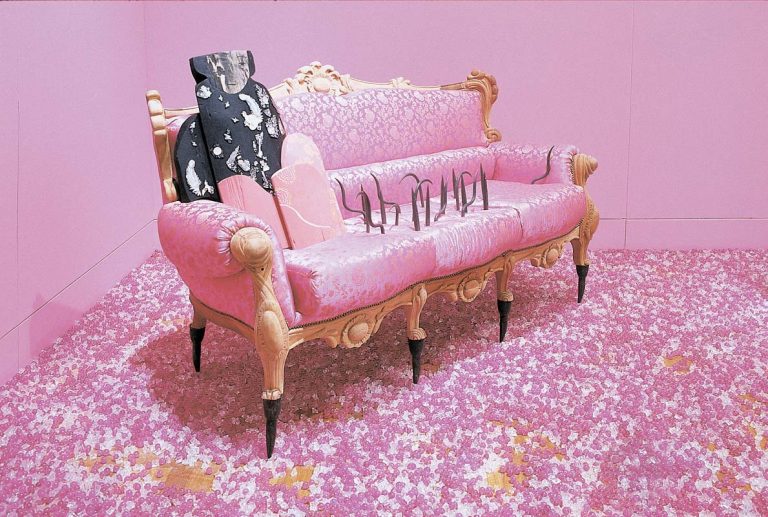We acknowledge the Traditional Owners of the land on which the Queensland Art Gallery | Gallery of Modern Art stands and recognise the creative contribution First Australians make to the art and culture of this country.

Yun Suk-nam / South Korea b.1939 / Pink sofa 1996 / Wood sofa covered in Korean silk, curved steel pins, steel pin legs on sofa, plastic balls, two wood sculptures painted with synthetic polymer paint, fragments of mother-of-pearl inlay, steel base / Installed dimensions variable / Purchased 1996. Queensland Art Gallery Foundation / Collection: Queensland Art Gallery | Gallery of Modern Art / © Yun Suk-nam
Yun Suk-namPink sofa 1996
Not Currently on Display
Pink sofa was commissioned for APT2 and continues the exploration of a set of themes and issues around feminism that have been central to Yun Suk-nam’s practice. Yun says, ‘I am seeking solutions to women’s situation both without — in critiquing representations used to enforce women’s limited options — and from within — via women’s collective assertion of full personhood.’1
The work incorporates many of the elements for which Yun was recognised at the time; in particular, two rigid female figures painted on wood, and a luxurious, curved sofa riven with knives, as a metaphor for the expectations placed on women and a gradual shift towards empowerment. Surrounding the sofa on the floor are pink and white plastic balls. The effect is to create a surface that prevents any access to the sofa. The pink that dominates the installation represents for the artist ‘an uncertainty of emotion, particularly of women, which stemmed from the feeling that they could exist nowhere.’2
Endnotes:
1. Yun Suk-nam, The Second Asia-Pacific Triennial of Contemporary Art (artist’s statement insert), Queensland Art Gallery, Brisbane, 1996, n.p.
2. Artist’s file, QAGOMA Research Library.
Due to her responsibilities as a mother and a carer, Yun Suk-nam did not become an artist until the age of 40. Despite having no formal training, she quickly established a vibrant installation practice exploring the position of women in a patriarchal society supported by traditional Confucian ethics. Pioneering the development of feminist art in South Korea, she was a key figure in both minjung misul (people’s art) — which was aligned with the pro-democracy movement of the 1980s — and the more freewheeling Alternative Culture Corporation.
Compassionate and full of empathy for the position of Korean women, Yun’s work is based on personal expressions of a political position which is inclusive. Drawing on her cultural traditions, Yun utilises familiar objects that perform a subversive function in her installations.